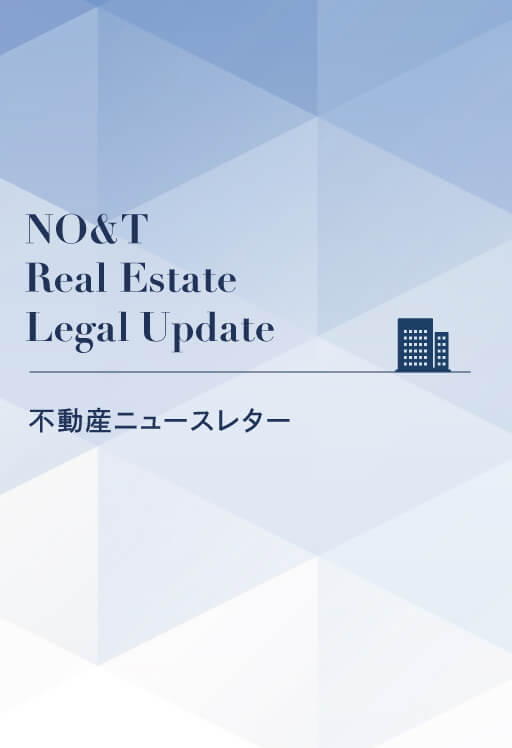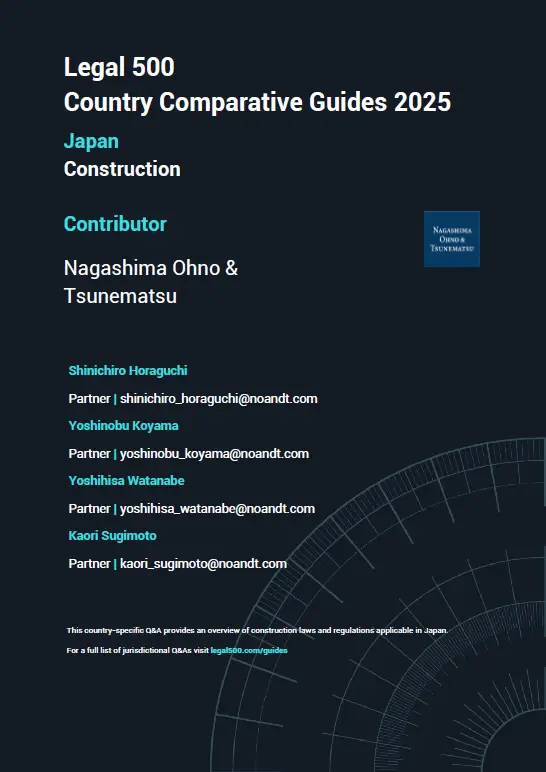
NO&T Asia Legal Review
Under current law, development rights of a commercial housing project may be granted to a company in one of the following methods: (i) land auction, (ii) project tendering, or (iii) approval of developer.
With respect to methods (i) and (ii), the State will allocate land to the developer who has won the bidding and paid land use fee (“LUF”), equal to the bid price, to the State. These two methods are in the nature of acquisition of land from the State without needing to obtain a land conversion permit (“LCP”) from a competent authority to change the land use purpose.
Whereas, method (iii) allows a company to acquire land from existing occupants and obtain an investment policy approval (“IPA”) and approval of investor (“IA”) (collectively, “IPA/IA”) from the competent authority to develop the project※1. Thereafter, the developer will need to obtain the LCP and pay LUF to the State.
Over the past nearly 20 years, method (iii) has been the most common way to obtain the development rights of a commercial housing project. However, the conditions relating to this method (iii) have been amended several times and are expected to be further amended in the future. In this article, we discuss the recent changes regarding this method (iii).
Prior to the effective date of the LRH (i.e., 1 July 2015), the selection of developer of a commercial housing project was made in accordance with the old LRH 2005 and its implementation regulations, according to which a company may be selected as developer if such company had the land use rights (“LUR”) for “any types of land” as long as the use of such land for residential development is consistent with the approved zoning※2.
This rule was tightened under the LRH. Article 23.1 of the LRH set a new condition for selection of developer by stipulating that the company must have acquired “residential land” for the project. This wording was strictly interpreted by the relevant authorities in that the company was required to have residential land for the entire project land. Consequently, only small sites (mostly suitable for a boutique apartment project) could qualify for grant of the IPA/IA, while hundreds of other larger sites were unable to obtain the IPA/IA due to the lack of residential land for the entire project land.
Article 75.1(c) of the LOI (which amends Article 23.1 of the LRH, effective from 1 January 2021) permitted a company has the LUR for “residential land and other type of land” to be selected as a developer, provided the non-residential land portion is permitted by a competent state agency to be changed to residential land.
This amendment allows those companies which have acquired less than 100% residential land (i.e., residential and other type of land) to be issued with the IPA/IA as long as the non-residential land portion has been issued with the LCP to convert into residential land. However, in accordance with the Land Law 2013, to be issued with the LCP, the developer must first obtain an investment approval (which appears to mean IPA/IA) from the competent authority in accordance with the LOI. Therefore, this has become a chicken and egg situation and consequently, although the law appears to include the case of “residential land and other type of land”, those companies who may fall into this case have not been able to obtain the IPA/IA due to the difficulty to get the LCP.
In early 2022, the National Assembly passed Law 03 to amend nine different laws (including the LRH and LOI), effective from 1 March 2022. Under Law 03, Article 23.1 of the LRH is further amended to ease the requirement on the LCP. In particular, the developer may be issued with the IPA/IA if the non-residential land portion “meets the eligibility requirements for change in purpose of land use for the project”.
The wording in this amendment indicates that the condition of having the LCP is no longer required. Instead, the non-residential land is simply required to meet the requirements for getting the LCP in order to be issued with the IPA/IA. This appears to be an effort of the law- makers to clear the chicken and egg situation. The amendment also makes clear that following the issuance of the IPA/IA, the developer must obtain the LCP and pay the LUF to the State for the land use conversion.
Notably, Law 03 does not include the case where a company has acquired only “other type of land” (i.e., non-residential land). The original draft proposed by the Government includes three cases for selection of developer in accordance with Article 23.1 of the LRH 2014: (a) residential land, (b) residential land and other types of land, and (c) other types of land. The National Assembly eventually refused to include case (c) in Law 03/2022. It has been reported that the law makers were concerned that in case (c), the developers would pay less LUF to the State as compared to the LUF payable under the methods (i) or (ii) (land auction or project tendering) and therefore, there have been opinions that case (c) should be conducted via land auction or project tendering.
It has been reported by the media that about 200 projects in Ha Noi and Ho Chi Minh City, which fall into case (c), will have to wait for the new rule.
Although both amendments under the LOI and Law 03 attempt to relax the conditions for selection of commercial housing developer by providing an additional case for granting IPA/IP to those companies that have acquired “residential land and other type of land”, they fail to include the case of “other type of land” like the conditions applicable under the old LRH 2005 and its implementation regulations. It is unclear whether the National Assembly will further amend the LRH to allow the companies that hold 100% non-residential land (i.e. other types of land) to be approved as developer under method (iii) in the future or if they have to go through method (i) and (ii), how their land costs will be dealt with.
*1
Generally, to secure the development rights of a commercial housing project, the developer must obtain an IPA and IA from competent authorities in accordance with the LOI and LRH (as defined below).
*2
Article 13.3 of Decree 90/2006 and Article 13.1 of Decree 71/2010 on implementation of the LRH 2005.
This newsletter is given as general information for reference purposes only and therefore does not constitute our firm’s legal advice. Any opinion stated in this newsletter is a personal view of the author(s) and not our firm’s official view. For any specific matter or legal issue, please do not rely on this newsletter but make sure to consult a legal adviser. We would be delighted to answer your questions, if any.


Makoto Saito, Shinichiro Horaguchi, Yoshihisa Watanabe (Co-author)


Takehito Matsumoto


Takashi Itokawa, Takahiro Kitagawa (Co-author)


Kenji Utsumi, Masatsura Kadota, Junji Yamanaka (Co-author)


Makoto Saito, Shinichiro Horaguchi, Yoshihisa Watanabe (Co-author)


(April 2025)
Shinichiro Horaguchi, Yoshinobu Koyama, Yoshihisa Watanabe, Kaori Sugimoto (Co-author)


(December 2024)
Mami Ikebukuro, Kenji Utsumi, Makoto Saito, Shinichiro Horaguchi, Yoshihisa Watanabe (Co-author)


Hoai Tran


Makoto Saito, Shinichiro Horaguchi, Yoshihisa Watanabe (Co-author)


Takehito Matsumoto


Takashi Itokawa, Takahiro Kitagawa (Co-author)


(April 2025)
Shinichiro Horaguchi, Yoshinobu Koyama, Yoshihisa Watanabe, Kaori Sugimoto (Co-author)


Patricia O. Ko


Ngoc Hoang


Yuan Yao Lee


Chattong Sunthorn-opas, Thunsinee Sungmongkol (Co-author)


Patricia O. Ko


Ngoc Hoang


Yuan Yao Lee


Chattong Sunthorn-opas, Thunsinee Sungmongkol (Co-author)


Ngoc Hoang


Long Nguyen


Nga Tran


Hoai Tran